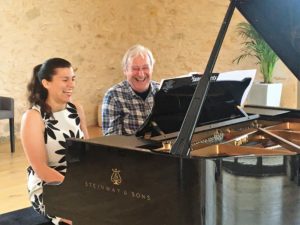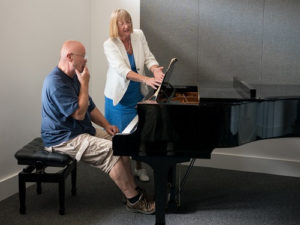
Amateur pianists at La Balie, France
“I wish I’d kept up my piano lessons!”
How many people do you meet who express this regret, that they’d continued childhood piano lessons into adulthood?
At my piano club, there are people who have played all their life; others who, like me, gave up, often in childhood or their teens, only to return to the instrument later in life; and those who have taken up the piano from scratch as adults, setting themselves on a path which brings pleasure and frustration in equal measure. For all of us, there is a huge sense of personal growth, self-determination and fulfilment.
The idea that once one reaches adulthood it is “too late” to take up the piano – or indeed any other instrument – is nonsense. The body and, more importantly, the brain is still receptive and highly malleable, and research has amply demonstrated that the brain remains “plastic” (able to adapt and change) throughout our life. Learning a musical instrument stimulates almost every part of the brain, especially those areas associated with memory. Contrary to common misconceptions, the adult brain continues to carve new neural pathways throughout life, and learning an instrument stimulates this and improves cognitive function.

Student at piano course
Dismiss any idea that it is “harder” to learn an instrument as an adult. Unlike children, who may be compelled to learn an instrument by their parents, the adult learner makes the personal choice to pursue music and has the motivation, intent and self-discipline to stay the course.
It takes a degree of courage to decide to learn, or return to, an instrument, and to take lessons with the teacher and the first few lessons can be extremely daunting, but find the right teacher and the activity is an extraordinarily fulfilling experience. No dull exercises or drills or exams, but a stimulating flow of ideas and inspiration, exploring repertoire and honing one’s skills, while life experience and maturity bring a special dimension to lessons and learning.
I first started to learn the piano when I was about five years old, took all my grade exams, and then abruptly stopped playing when I left home to go to university (to study not music but Anglo-Saxon and Medieval literature). I hardly touched the piano for 20 years, but when I returned to it, I did so with an all-consuming passion. I took lessons with master teachers and attended masterclasses with leading concert pianists. I set myself the personal target of learning and preparing music at a very high level to fulfil the requirements of professional musical qualifications (two performance diplomas) and organised and performed in my own concerts. Today the piano is my life – and my work – and it has put me in touch with so many wonderful, inspiring and interesting people. I certainly intend to go on playing the piano and engaging with the literature and those who play it for as long as I can.
It’s never too late!





I took up bass guitar at age 50. A bucket list item for me. One of the best decisions I’ve ever made. I have made many friends playing music and am now playing gigs. Playing music is very much a passion for me. Like many others though, I only wished I had taken it up much, much sooner.